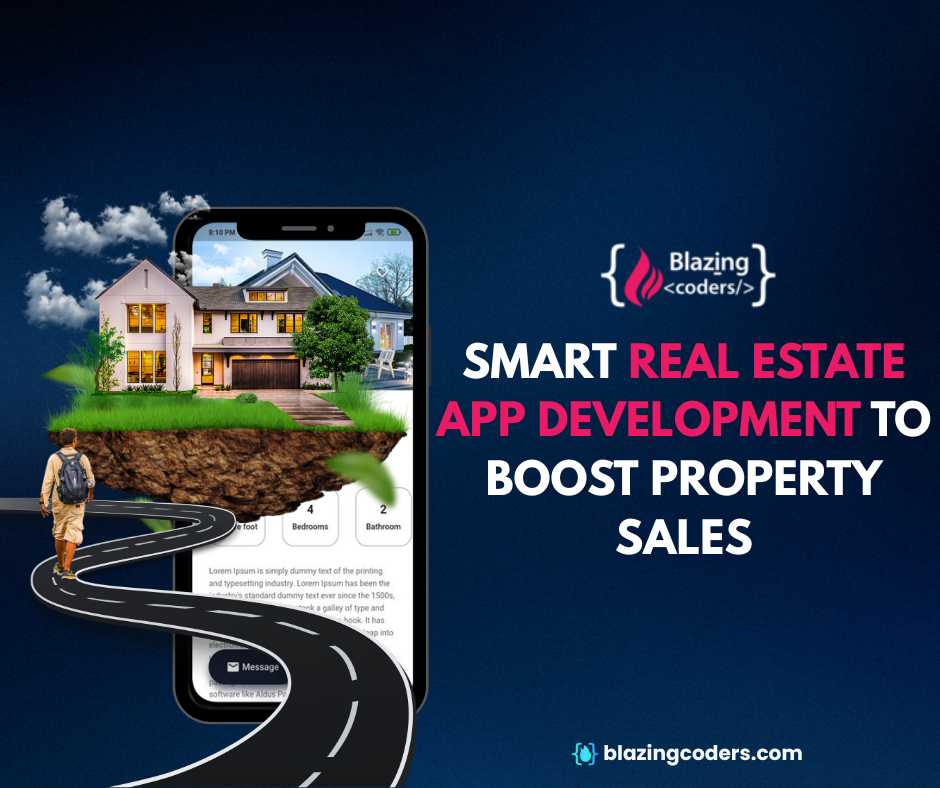Smart Real Estate App Development to Boost Property Sales
In today's technologically advanced world, the real estate sector is changing dramatically. Buyers no longer hold out for printed brochures or property fairs. They demand real-time information at their fingertips, virtual tours, and fast access. The creation of intelligent real estate apps has been made possible by this change in consumer behaviour, transforming traditional real estate transactions into tech-enabled, data-driven, and quicker processes.
The Rise of PropTech: A Global Trend
The global PropTech market is anticipated to develop at a compound annual growth rate (CAGR) of 9.3% to reach around USD 86.5 billion by 2032, according to Statista. The demand for smart systems that link buyers, sellers, and realtors with the least amount of hassle is driving this expansion. Smart real estate applications are becoming necessary tools for developers and realtors looking to increase property sales; they are no longer optional.
Why Mobile Apps Matter in Real Estate Sales
In India, where more than 80% of internet users access material through smartphones, mobile-first behaviour is prevalent. By providing on-the-go access to property listings, GPS-enabled map views, loan calculators, virtual tours, and AI-powered suggestions, real estate applications take advantage of this trend. Through increased interaction and personalisation, these features significantly cut down on the time needed to close a business.
Boosting Buyer Confidence with Smart Features
Due to a lack of knowledge or concerns about trust, buyers frequently hesitate. With clever features like AR/VR-enabled virtual tours, a well-designed real estate app eliminates these obstacles and lets potential buyers view properties from the comfort of their homes. While push notifications educate customers about price reductions, new launches, or site visit schedules, chatbots that are connected with real-time query resolution help to foster confidence.
AI and Big Data: The Unsung Heroes Behind Property Matching
Listing aggregation is only one aspect of smart apps. To provide individualised home recommendations, they examine user behaviour, preferences, location, and budget. By selecting the greatest match from thousands of listings, AI systems increase lead conversion by almost 30%. In order to speed up sales cycles, realtors should concentrate on qualified prospects who are actually interested.
Empowering Builders and Agents with CRM Integrations
Managing leads, monitoring follow-ups, and planning site visits are common challenges for real estate companies. Operations are streamlined and no leads are lost thanks to a clever software that is integrated with CRM solutions. Real-time inventory tracking, communication automation, and immediate sales performance statistics are all tools that builders may use to make data-driven decisions.
The Power of Virtual Property Showcases
Virtual property tours became essential in post-pandemic India, but they are now a competitive advantage. Up to 60% more people interact with listings that include drone footage and 3D walkthroughs than those that only include still photos. After seeing immersive material, buyers are more likely to schedule site visits, which greatly increases the likelihood of conversion.
Seamless User Experience: A Key to Higher Engagement
When designing real estate apps, user experience (UX) is crucial. Every little thing counts, from easy navigation to pages that load quickly. While apps that are optimised for speed and clarity enjoy higher retention rates, slow or congested apps have higher bounce rates. Secure document sharing, EMI calculators, feedback choices, and property comparison tools all improve usability and foster user confidence.
Trends Driving Smart Real Estate App Development in 2025
The upcoming generation of real estate apps is being shaped by a number of trends as 2025 approaches. Multilingual content, blockchain-based documentation, IoT-enabled smart home previews, and voice search integration are becoming commonplace. The increasing need for intelligent interfaces is demonstrated by the fact that 47% of Indian real estate purchasers now prefer mobile apps with AI assistants to help them with their search.
ROI for Builders and Developers
Although creating a smart real estate app might seem like a big initial cost, the potential rewards are encouraging. After implementing mobile app solutions, real estate firms have seen a 25% decrease in operating expenses and a 40% boost in enquiries. Building companies can target the correct demographic and maximise their marketing efforts with a broader reach, improved lead management, and data analytics.
Choosing the Right Development Partner
Investing in a clever real estate app might help you stand out from the competition if you're a builder, agent, or real estate startup. Seek out seasoned app development firms that can grow with your company, offer specific features, and have an understanding of the real estate industry. In addition to providing a solid product, the ideal partner will assist you in coordinating the app with your business objectives.
Conclusion
The creation of a tech-enabled environment that streamlines the home-buying process and boosts sales is the goal of smart real estate app development, which goes beyond simply digitizing property listings. Apps with AI, AR, automation, and big data insights are no longer futuristic; rather, they are essential in a sector as cutthroat as real estate. The moment to act wisely is now if you want to maintain your relevance and increase your real estate sales.






